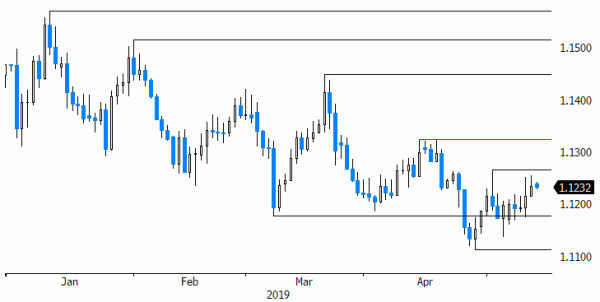- Rates: US-China bickering supports core bonds
Friday’s uptick in risk sentiment weighed on core bonds, but losses got erased over the weekend. US President Trump gave China a one-month deadline to seal a deal or it faces tariffs on all its exports to the US. With today’s empty eco calendar, the trade dispute continues to dominate trading, ensuring us to hold a positive bias towards core bonds. - Currencies: How far will EUR/USD rebound go if trade tensions persist?
Last week, the yen and the euro outperformed the dollar on the US-China trade dispute. On Friday, the dollar also suffered slightly from a soft US CPI. The US-China trade dispute probably won’t be solved anytime soon. The dollar might lose further interest rate support but uncertainty will also affect the EMU. EUR/USD is nearing first intermediate resistance
The Sunrise Headlines
- US equity markets managed to overturn initial weakness, to close the week on a positive note. Main indices gained up to 0.44%. The US-Sino trade conflict spoils sentiment again at the start of the week with Asian bourses losing around 1%.
- The US is expected to release details of additional Chinese goods ($300bn) subject to 25% import levies. Trump and Xi Jinping will meet at the end of June G20 Summit, but China wants to continue talks in Beijing in the meantime.
- UK PM May’s office said they want to reopen Brexit talks with the EU. More specifically, they want to review the political declaration, the non-binding part that focuses on future ties, to get Labour on board for a cross-party deal.
- Greek PM’s Tsipras’ minority government survived a confidence vote. The vote was triggered by the opposition to censure an MP. The ruling Syriza party is lagging in polls, but last week’s fiscal stimulus promises narrowed the gap.
- The final tallies of last week’s South African elections showed that Ramaphosa’s ruling ANC-party extended its political power by taking 57.5% of the votes and recovering from a record low 54.5% at municipal elections in 2016.
- The IMF warned that external risks to Ireland’s strong growth rate are increasing. They point to the escalation in global protectionism, changes in international corporate taxation and of course Brexit.
- Today’s economic calendar is extremely thin with only Norwegian Q1 GDP and Bank of France sentiment indicator. Fed governors Rosengren, Clarida and Kaplan are scheduled to speak.
Currencies: How Far Will EUR/USD Rebound Go If Trade Tensions Persist?
Is EUR/USD rally on trade tensions sustainable?
EUR/USD kept a cautious upward bias on Friday. After a slow start, the pair was propelled to the mid 1.12 area as US CPI data (slightly) missed market expectations. US-German interest rate differentials initially narrowed further, but this move was partially reversed at the end of the session even as uncertainty on the next steps in the US-China trade conflict persisted. EUR/USD closed the session at 1.1233 (from 1.1215). USD/JPY traded quiet resilient and finished at 109.95.
This morning, sentiment in Asia remains risk-off. China is still expected to take retaliatory action against last week’s US tariffs’ hike. Comments from US (and Chinese) officials this weekend suggest that the dispute probably will drag on for a while. Asian equites and US equity futures are losing further ground. US yields decline. The picture on FX markets is mixed. The yen gains a few ticks (USD/JPY 109.75 area). The yuan (USD/CNY 6.85) and the likes of the won (USD/KRW 1184) are enduring substantial losses. EUR/USD is trading little changed in the 1.1230 area.
There are no important EMU or US data today. So global FX trading will be sentiment driven as investors are awaiting the next steps in the US-China trade war. At least for now there is no indication that a de-escalation will occur anytime soon.
Last week, the trade dispute weighed more on the dollar than on the euro (and the yen). Markets saw a growing chance for Fed rate cuts if the trade tensions were to undermine US growth further down the road. Question is how long this trade might persist. EMU growth is also at risk and European markets will also be affected by the global risk-off. In this context, it isn’t that evident to see sustained euro outperformance. We expect the EUR/USD 1.11/1.14 range to hold. Intermediate resistance is coming in at 1.1265 and 1.1324. Further EUR/USD gains might become less easy from here on.
On Friday, UK Q1 growth printed strong at 0.5% Q/Q. The details were constructive, too. However, the strong growth didn’t help sterling to any sustained gains as the Brexit stalemate persists. Brexit negotiations are expected to continue today. However, the water between labour and the conservative government remains deep. Division within both parties make an agreement even less evident. For now, we don’t see a trigger for a sustained sterling comeback. At the same time, upcoming EUR/GBP resistance (0.8683/0.8723) combined with a slowdown of the EUR/USD rebound might make EUR/GBP gains less evident.
EUR/USD: nearing first intermediate resistance

